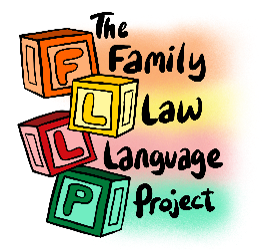Language Matters
by Jo O’Sullivan of O’Sullivan Family Law
I write following the publication of the report, ‘Language Matters’ in October 2022. The report is a timeous and long overdue reminder that language really does matter. In legal letters, in court papers, in family mediation – everywhere that separating couples and parents find themselves.
Here is a link to the report:
Following the Family Solutions Group recommendations in the "What about me?" report, the President of the Family Division (Sir Andrew McFarlane) commissioned the report, “Language Matters”, which calls for a fresh look at the way family law is framed and delivered to those who need it.
But I’m going to start this blog somewhere else entirely…...
Dale Spender, in her book published in 1980, ‘Man Made Language’ argued two things: (i) that language determines the limits of our world; constructs our reality and (ii) that language is man-made and reflects a patriarchal society. Certainly, the Language Matters’ report would agree with the first point.
It wasn’t long ago that women in the UK not only took their husband’s last name but were also referred to by their first name too e.g., Mrs John Smith. Just read some Agatha Christie. Today, women still change their last names but they do (at least) keep their first names.
The way we name things, the way we have made them male – indicates subliminally to all what’s important; that men are more important. There are endless examples, one is the that of ‘Chairman’ – it’s now more common to use the word ‘Chair’. Things are thankfully changing from the 1980’s when Dale Spender wrote her book.
In the legal world* Lord Chief Burnett of Maldon (Lord Chief Justice of England and Wales) announced on 1 December 2022 that instead of calling District Judges (who much of the family law financial work) ‘Sir’ or ‘Madam’ – we must now address them a ‘Judge’ (when not sitting in open court).
Although the reason stated is that it’s simpler for the litigant in person (those without a lawyer to represent them in court) I wonder if it’s part of a wider movement away from unhelpful gendered language.
Turning back to the other facet of the book – that language reflects our reality. When we use the language of ‘battle’ in our family law work – don’t we create a ‘war’?
Instead of ‘custody battle’ why not say ‘trying to sort out arrangements for the children’.
To quote from the report, ‘Having “sides” - Parents may have different perspectives but there are no sides. Children want to be free to love both parents. Criticising the other parent or being on opposing ‘sides’ is unhelpful and possibly harmful.’
I agree with the report about the description and assumption that couples/parents are in ‘disputes’ and even ‘dispute resolution’ as the non-court options are often described. Parents may not have a ‘dispute’ – or at least they didn’t until they looked at a solicitors’ website. They just need a bit of help (Stephen Anderson). Can’t we just call it ‘sorting things out’? There’s no need to upgrade a difference of opinion into a full blown ‘dispute’.
Solicitors will refer to the other solicitor as ‘the other side’ – what does that say to our clients? That there are sides, that need to be nurtured and defended. And of course, the opposite, to attack the other side – it’s just the way it’s done.
The report makes the same calls that I do in my book (edited by Only Mums&Dads), ‘(Almost) Anything But Family Court’, that we stop glamorising the aggressive lawyer in our Chambers Guides and awards. (Don’t get me started on the way separation is dealt with in the media.)
I love the way the Language Matters report suggests we humanise all our legal documents and legalese. There are many brilliant examples, one being instead of writing a ‘Position Statement’ instead you prepare a ‘Summary for the judge’ or a ‘Hearing summary’ or ‘Approach’ - The approach taken by [name]’
Lots of this will have to be adopted by the rule makers and form writers. But it’s all doable and easy. We could all start making the changes needed today.
Change the language: Change the attitude and expectation.
Everything about the court system is adversarial; which is shocking given these couples were once intimate. Even the court names e.g., Smith v Smith or Mother vs Father set things up and are unnecessary. It’s not a war, it’s not a football match or a game. It’s the real life of a family and their children. The outcome is important but there are no winners, no score draws. Just a family that must limp on in the aftermath.
Sometimes, very often, solicitors’ letters are antagonistic and polarising. They are often formal, not using first names or and are anything but mutually helpful. They set the scene for their client, seek what they want and that’s about it. A solicitor’s letter is terrifying to receive. So much so that I advocate not sending letters at all (see Chapter 3 of ‘(Almost) Anything But Family Court’). Be a human. Pick up the phone. Have a meeting. Letters are just a prelude to court given their unrelenting lack of humanity. Or change the solicitor’s letter, as set out on the last pages of the Language Matters report.
Do take a few minutes to read the Language Matters report. It’s easy to read and full of examples to help us change things. Remember, language = our reality. Change the language, change the reality. The experience of separating couples and parents can be improved by this simple but effective change. Make the change and let’ reap a more peaceful outcome and environment.
*Joshua Rozenberg in Substack 2 December 2022.
